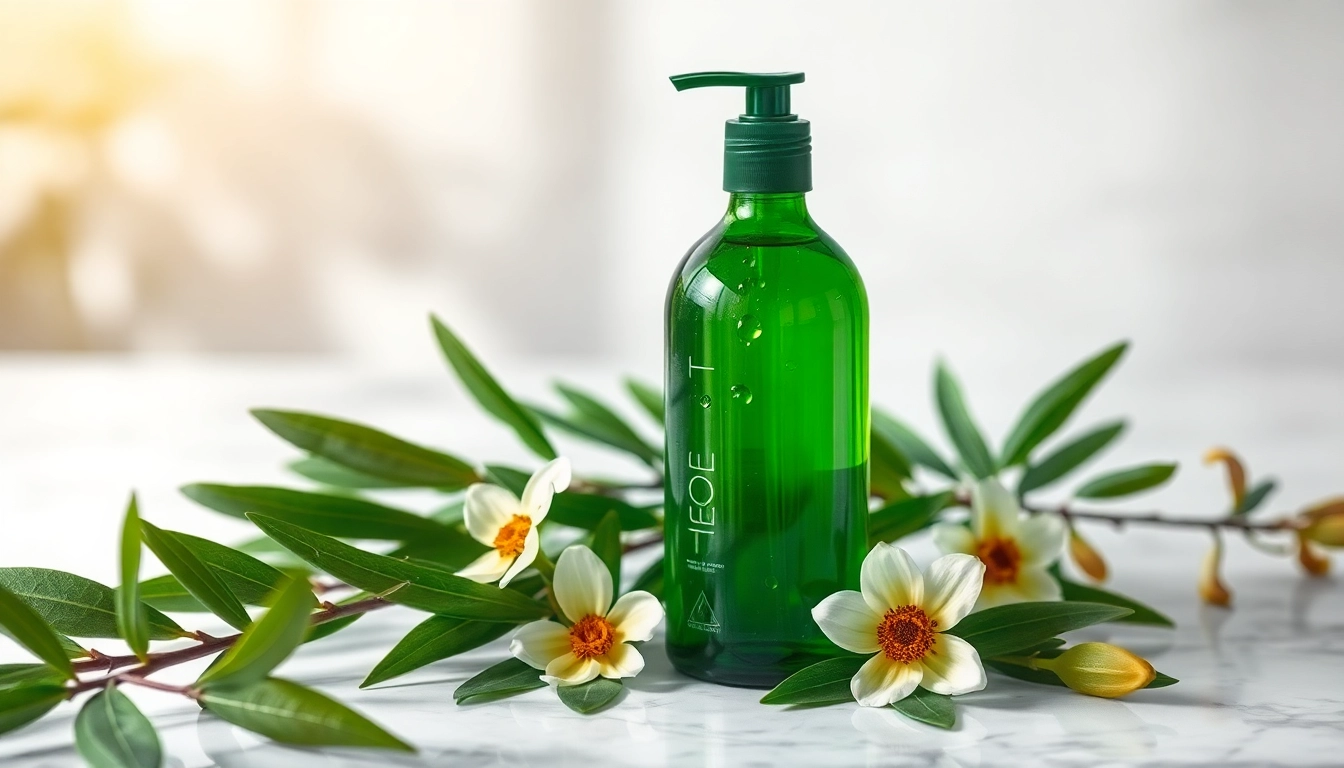Understanding Tea Tree Oil’s Role in Hair Care
What is Tea Tree Oil?
Tea tree oil, derived from the leaves of the Melaleuca alternifolia, a plant native to Australia, has long been celebrated for its remarkable medicinal and cosmetic properties. Known for its potent antiseptic qualities, tea tree oil is a favorite in various beauty and personal care products, particularly shampoos and conditioners. This natural essential oil is rich in compounds like terpenes and cineole, which contribute to its healing and soothing effects, making it an ideal ingredient for hair care.
Benefits of Tea Tree Oil for Hair
Incorporating tea tree oil into your hair care routine can offer a multitude of benefits. Some of the most notable benefits include:
- Antimicrobial Properties: Tea tree oil’s natural antiseptic properties make it effective against bacteria and fungi. This helps prevent scalp infections and dandruff, ensuring a healthier scalp environment.
- Reduction of Dandruff: Its antifungal abilities can reduce the occurrence of dandruff by combating the underlying causes, such as Malassezia fungi that thrive on oily scalps.
- Unclogs Hair Follicles: Regular use of tea tree oil can unclog hair follicles and promote a healthy scalp, which is crucial for hair growth.
- Soothes Irritation: Its anti-inflammatory properties help soothe an irritated scalp, which can alleviate itching and discomfort.
- Regulates Oil Production: Tea tree oil helps balance oil production on the scalp, which can prevent greasy hair and maintain a fresher look for longer.
How to Incorporate Tea Tree Oil in Your Routine
Incorporating tea tree oil into your hair care routine can be straightforward. Here are some effective ways to do so:
- Shampoo with Tea Tree Oil: One of the easiest methods is to choose a shampoo with tea tree oil as a primary hair cleanser. This allows you to benefit from its properties without additional steps.
- DIY Hair Mask: Combine a few drops of tea tree oil with carrier oils like coconut or olive oil to create a hair mask that nourishes your hair and scalp.
- Scalp Treatment: Mix tea tree oil with a mild shampoo to create a concentrated treatment that can be applied directly to the scalp for targeted relief.
- Leave-In Product: Some hair serums incorporate tea tree oil, allowing you to maintain scalp health and manageabilities, such as frizz, throughout the day.
Choosing the Right Shampoo with Tea Tree Oil
Ingredients to Look For
When selecting a shampoo that features tea tree oil, consider products that have complementary ingredients for best results. Here’s what to look for:
- Aloe Vera: Known for its soothing and hydrating properties, aloe vera can be a perfect partner for tea tree oil, enhancing moisture retention and calming irritation.
- Rosemary Oil: This essential oil promotes circulation to the scalp, aiding hair growth alongside tea tree oil.
- Jojoba Oil: Mimicking natural sebum, jojoba oil can help balance the scalp while providing moisture without clogging pores.
- Regular Surfactants: Non-toxic surfactants should be prioritized for a gentle cleanse that avoids stripping essential oils from your hair.
Common Mistakes in Hair Care
Many individuals make common mistakes in their hair care routines that can counteract the benefits of quality products like tea tree oil shampoos. Here are a few pitfalls to avoid:
- Overusing Products: Applying too much shampoo or using it too frequently can lead to buildup and irritation. Balance is key.
- Skipping Conditioner: Always follow up with a conditioner to balance moisture levels in your hair, especially when using clarifying shampoos.
- Ignoring Ingredients: While tea tree oil is beneficial, other harmful ingredients like sulfates or parabens can negate its advantages. Always read labels carefully.
Product Recommendations
While the market offers a plethora of products boasting tea tree oil as a key ingredient, here are some specially recommended options to consider:
- Luxeva 3-in-1 Biotin Rosemary Hair Growth Shampoo & Conditioner: Enriched with biotin and natural extracts, this product promotes growth while ensuring a healthy scalp.
- Paul Mitchell Tea Tree Special Shampoo: Known for its refreshing scent and cleansing properties, this shampoo revitalizes and invigorates your hair and scalp.
- OGX Tea Tree Mint Shampoo: This option combines the invigorating properties of tea tree with mint, providing a refreshing cleansing experience.
Application Techniques for Optimal Results
Frequency of Use
To experience the best outcomes from your shampoo with tea tree oil, consider the frequency of your washing routine. For most hair types, washing your hair 2-3 times a week with tea tree oil shampoo is adequate to maintain scalp health while preventing oiliness. However, individuals with oily hair may benefit from more frequent washes, as long as they follow up with a nourishing conditioner.
Complementary Hair Care Practices
Maximizing the benefits of tea tree oil involves more than just using a quality shampoo. Implementing complementary practices can enhance your overall hair health:
- Regular Scalp Massages: Stimulate blood flow and promote hair growth by incorporating scalp massages into your washing routine.
- Balanced Diet: Consume foods rich in vitamins and minerals to nourish hair from the inside out, ensuring it is healthy and strong.
- Stress Management: Engage in activities that reduce stress, as high stress levels can adversely impact hair health.
Tips for Sensitive Scalps
Tea tree oil can be potent, which could result in irritation for those with sensitive scalps. Here are strategies to mitigate these effects:
- Patch Testing: Always perform a patch test before using any new product to check for allergic reactions.
- Dilution: If you experience sensitivity, dilute tea tree oil with carrier oils or opt for shampoos where it is less concentrated.
- Hydrating Conditioners: Use a rich, moisturizing conditioner to combat any potential dryness caused by tea tree oil.
Evaluating Your Hair Health
Signs You Need a Change
Recognizing when your hair care routine needs an overhaul is imperative for maintaining healthy hair. Look out for the following signs:
- Excessive Shedding: Noticeable hair loss can signal that your current products may not meet your scalp’s needs.
- Dull Appearance: Lackluster hair can be a sign of product buildup or subpar nutrition. Switching to a specialized shampoo may improve shine.
- Persistent Dandruff: If dandruff or irritation persists, it may be time to incorporate a tea tree oil shampoo into your regimen.
Comparative Analysis of Other Herbal Shampoos
While tea tree oil is incredibly beneficial for hair care, several other herbal ingredients offer their unique advantages:
- Lavender Oil: Known for its calming aroma, lavender oil can promote relaxation and alleviate dryness in the scalp.
- Chamomile: Beneficial for blond hair, chamomile can brighten and add shine while soothing the scalp.
- Henna: A natural dye and conditioning agent, henna helps improve hair texture and color naturally.
When to Consult a Professional
Sometimes, having professional advice is the best course of action. Consider consulting a dermatologist or a trichologist when:
- Your hair loss or scalps issues are severe or persistent.
- You notice skin conditions like dermatitis or psoriasis affecting your scalp health.
- You get no improvement from over-the-counter treatments and need specialized care.
Long-Term Benefits of Using Shampoo with Tea Tree Oil
Improving Scalp Health
Regular use of shampoo containing tea tree oil can significantly improve your overall scalp health. Enhanced blood circulation, balanced oil production, and a decreased probability of infections create a conducive environment for hair growth and maintenance over time.
Reduction of Hair Loss
Effective scalp treatment is essential for reducing hair loss. By addressing the root causes such as inflammation and blocked follicles, tea tree oil helps create conditions that may lead to hair regrowth and lower shedding rates.
Enhancing Hair Shine and Texture
The holistic properties of tea tree oil promote shinier and healthier-looking hair. By maintaining a balanced pH and moisturizing the hair, tea tree oil can contribute to improved texture, making hair feel more manageable and vibrant.



